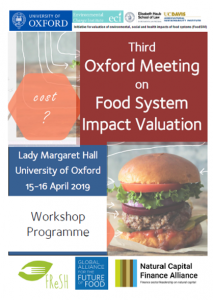In our latest blog, Senior Lecturer in Agribusiness Dr Diogo Souza Monteiro talks about his participation in the Oxford Meetings on Food System Impact Valuation, and the growing need to change food consumption habits in order to preserve natural capital.
The Oxford Meetings on Food System Impact Valuation, hosted by Dr. John Ingram, leader of the food program at Oxford University Environment Change Institute, joins academia, businesses, governmental agencies and non-governmental organisations to work on Natural Capital Valuation and its implications. Now in its third year, the focus of 2019 was to capitalise on the forward momentum on the methods and initiatives already in place to evaluate natural capitals. I was fortunate to attend and lead sessions at the third meeting, held on the 15 and 16th of April.

Food System Impact Valuation Meeting
Before I highlight some of the main initiatives discussed, it is worth recapping how we have arrived at discussions surrounding natural capital and its implications. Although not new, there is an emerging debate in policy and business communities surrounding how to manage the effects of climate change on human societies. The 1983 Brundtland report “Our Common Future” defined ‘sustainable development’ and highlighted the need to reconcile human activities with the natural environment and biosphere that supports our societies. However, only now is there a sense of urgency and an increasing consensus that, if we (as a society) persist in our current paradigm, large parts of the earth may no longer be habitable for future generations.
In order to mitigate the impacts of human activity on our planet, we need to be able to identify, understand, measure and manage those activities and their consequences which contribute towards climate change. In particular, food production and consumption are heavily dependent on natural resources. Therefore, there are several groups developing and implementing frameworks to evaluate the impact of different food sectors in the natural environment – hence the importance of the Oxford Meetings.
Since the concept of natural capital has been clarified, several organisations have developed frameworks and methodologies to measure this for both countries and businesses, such as the Natural Capital Coalition protocol. Additional sustainability frameworks have been developed that reflect a growing awareness of other capitals. These more holistic accounts of capital take into account natural, human, social and economic (manufacturing and financial) capitals in human activities. These “true cost” protocols are particularly pertinent in relation to food, such as those proposed by the Sustainable Food Trust or the FReSH true cost of food program. The purpose of these is to inform public and corporate policy and investment decisions, the latter used to identify the risks of different activities and their revenue streams. Moreover, they will impact our individual behaviour as consumers, including the discouragement of the consumption of products with high impacts on nature. Most discussions at the Oxford Meeting centred on the need for harmonisation of these true cost account frameworks and, more importantly, on how these can be used to support consumer decisions and promote dietary change.

Lady Margaret Hall – the conference venue
As part of the meeting, participants were divided in groups to discuss emerging issues on several themes including standardisation, finance, public policy and research projects. I led discussions in one of the public policy sessions, focusing on how the principles and methods of true cost accounting can inform policy promoting the use of food labels to increase transparency and foster consumer behaviour change. Examples of labels designed to help consumers make more informed choices in relation to some dimension of natural impact include the Forest Stewardship Council (FSC) label in wood and paper products and the Rainforest Alliance label in foods.
However, there are several issues with these that were discussed during the session. Firstly, not all labels are equal or transparent surrounding the claim(s) they are communicating, and they do not necessarily take into account the true costs of the activities they are promoting. Another issue is that not all labels resonate with the consumer, with one participant highlighting that most consumers make choices solely based on price, meaning a label on a more expensive product that might reflect the true cost of production will not be chosen by most consumers.
Finally, the proliferation of labels communicating some dimension of sustainability — often with conflicting messages — makes choices difficult for consumers. This does, however, highlight an opportunity to develop a comprehensive label underpinned by sound food standards and true costs accounting methods for products in a given sector. If supported through policy to ensure a mandatory label, products with higher true costs of production would not be able to be carry lower prices. However, we are far from a consensus on methodologies and frameworks to determine what the true costs of a food product are, and the discussion session concluded that it is premature to propose such a label. Also, implementing mandatory labels based on true cost principles will be controversial and the charging the true cost of food may have important welfare and equity implications that need to be taken into account.
Labelling and underlying food standards are topics where there is growing expertise in CRE and SNES. For example, Dr Luca Panzone has done significant contributions to our understanding of the impact of carbon footprint labels on consumer choice. I have examined whether nutrition labels drove product reformulation and how alternative ways to convey diet information motivated consumer behaviour. CRE is therefore well positioned to continue to play a role in this important and urgent agenda.
